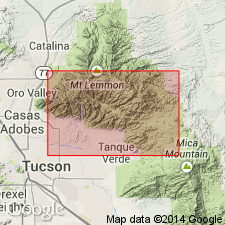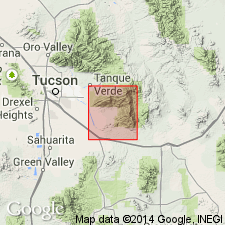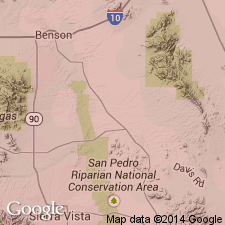
- Usage in publication:
-
- Santa Catalina gneiss
- Modifications:
-
- Original reference
- Dominant lithology:
-
- Gneiss
- AAPG geologic province:
-
- Southwestern Basin-and-Range region
Summary:
Pg. 379-380. Santa Catalina gneiss. Extensively developed pre-Cambrian gneiss on south side of Santa Catalina Mountains near Tucson, Pima County, Arizona. Remarkable for its tabular form, regular stratification, altitude at low angles, broad, flat surfaces, and, in places, extreme foliation, passing from coarse-grained tabular granitic gneiss into micaceous sericitic and hornblende schists. These gneissic and schistose rocks are members of the series of pre-Cambrian schists for which I proposed the name ARIZONIAN. They are widely distributed in middle and southern Arizona. Age is pre-Cambrian.
Source: GNU records (USGS DDS-6; Denver GNULEX).

- Usage in publication:
-
- Santa Catalina Group*
- Modifications:
-
- Revised
- Areal extent
- AAPG geologic province:
-
- Southwestern Basin-and-Range region
Summary:
Name "Catalina gneiss" replaced by Santa Catalina Group, a name first used by Blake (1908). Though name Catalina gneiss has been widely used in Tucson, AZ area since DuBois (1959, Ariz. Geol. Soc. Guidebook II, p.114) and McColly (1961, Ariz. Geol. Soc. Digest, v.4, p.87-92), formal adoption of name "Catalina" may lead to confusion with a similarly named Precambrian unit in CA. Rocks extend to Tortolita Mountains (Pinal Co) to northwest and Rincon Mountains (Pima Co) to southeast (Southwestern Basin-and-Range region). Generally, gneissic rocks not specifically recognized as being derived from Phanerozoic rocks by subsequent metamorphism are referred to as "Catalina gneiss" or now as Santa Catalina Group. Group is divided into Pinal Schist (Precambrian X) and Continental Granodiorite and Wrong Mountain Quartz Monzonite (new) (both Precambrian Y). In many areas, granitoid rocks form lit-par-lit sheets into the schist, or younger quartz monzonite into older granodiorite. Ages of foliation and lineation are unclear; may be as old as Precambrian and as young as Laramide (Late Cretaceous and Paleocene), or may be of several ages within this time span. Recrystallization followed tectonic disturbance and ended in late Oligocene or early Miocene. Name is applied to all pre-kinematic and syn-kinematic rocks of the Mazatzal revolution.
Source: GNU records (USGS DDS-6; Denver GNULEX).

- Usage in publication:
-
- Santa Catalina Group*
- Modifications:
-
- Age modified
- AAPG geologic province:
-
- Basin-and-Range province
- Southwestern Basin-and-Range region
Summary:
Santa Catalina Group. Present north of Tucson, in the Santa Catalina Mountains, Pima County, Arizona. Age of group changed from Precambrian X to Precambrian Y --to-- Precambrian X to Cretaceous or Tertiary; age of Wrong Mountain Quartz Monzonite modified from Precambrian Y --to-- Cretaceous or Tertiary. Report includes correlation chart, geologic maps.
Source: modified from GNU records (USGS DDS-6; Denver GNULEX).
For more information, please contact Nancy Stamm, Geologic Names Committee Secretary.
Asterisk (*) indicates published by U.S. Geological Survey authors.
"No current usage" (†) implies that a name has been abandoned or has fallen into disuse. Former usage and, if known, replacement name given in parentheses ( ).
Slash (/) indicates name conflicts with nomenclatural guidelines (CSN, 1933; ACSN, 1961, 1970; NACSN, 1983, 2005, 2021). May be explained within brackets ([ ]).

